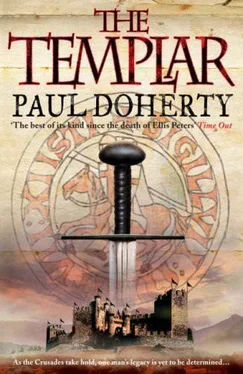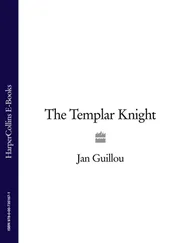P. Doherty - The Templar
Здесь есть возможность читать онлайн «P. Doherty - The Templar» весь текст электронной книги совершенно бесплатно (целиком полную версию без сокращений). В некоторых случаях можно слушать аудио, скачать через торрент в формате fb2 и присутствует краткое содержание. Год выпуска: 2010, ISBN: 2010, Издательство: Minotaur Books, Жанр: Исторические приключения, на английском языке. Описание произведения, (предисловие) а так же отзывы посетителей доступны на портале библиотеки ЛибКат.
- Название:The Templar
- Автор:
- Издательство:Minotaur Books
- Жанр:
- Год:2010
- ISBN:9780312576837
- Рейтинг книги:5 / 5. Голосов: 1
-
Избранное:Добавить в избранное
- Отзывы:
-
Ваша оценка:
- 100
- 1
- 2
- 3
- 4
- 5
The Templar: краткое содержание, описание и аннотация
Предлагаем к чтению аннотацию, описание, краткое содержание или предисловие (зависит от того, что написал сам автор книги «The Templar»). Если вы не нашли необходимую информацию о книге — напишите в комментариях, мы постараемся отыскать её.
The Templar — читать онлайн бесплатно полную книгу (весь текст) целиком
Ниже представлен текст книги, разбитый по страницам. Система сохранения места последней прочитанной страницы, позволяет с удобством читать онлайн бесплатно книгу «The Templar», без необходимости каждый раз заново искать на чём Вы остановились. Поставьте закладку, и сможете в любой момент перейти на страницу, на которой закончили чтение.
Интервал:
Закладка:
They went down cool, shimmering-white passageways, colonnades and porticoes brilliantly decorated in eyecatching floral patterns of blue, yellow, white and green. Scrolling vegetal decorations and elegant ochre calligraphy caught the eye. Some of the walls were decorated with glorious murals displaying green hexagons, or cranes, the birds of heaven, in full flight. Sunlight poured through fretted windows of coloured glass. Fountains splashed in bowls where red apples bobbed. Here and there, as Simeon later explained to Eleanor, were beautifully carved inscriptions to make the passers-by reflect, verses such as: ‘The tomb is a door which everyone must enter’, and ‘The Prophet of God, peace upon him, said “Hurry with prayer before burial and hurry with repentance before death.” ’
Eleanor found the contrast with the dark, damp, evil-smelling Frankish camp almost breathtaking. Rooms were warmed by rotund copper drums filled with burning charcoal and crammed with pouches of herbs that burst in the heat to exude the fragrance of the most exotic garden. She was surprised, too. Old images, impressions, thoughts and ideas were being swiftly destroyed. The Turks were not barbarians. In many ways, they reminded her of the Byzantines of Constantinople: cultured, sophisticated and courteous. Certainly fearsome and bloodthirsty in battle, but, she reflected ruefully, so were Hugh, Godefroi and Theodore. Undoubtedly these chambers and halls represented the luxury of the great lords of Antioch, but they were a sharp contrast to the dirty, freezing-cold manors and castles of the Franks.
Eventually they were ushered towards the Halls of Audience, their walls decorated by a technique known as thousand-leaves tracing, which secretly contained sacred names on tiles of turquoise within borders of navy blue. In the waiting chambers stood merchants bringing baskets of goods for the governor: nutmegs, cloves, mace, cinnamon and ginger. The sweet smell of these costly spices drifted everywhere. In other chambers traders waited to offer cloth, glass, metalwork, silk, taffeta, fur and ermine. Around the various doors clustered a horde of servants, cup-bearers, messengers, singers and zither players.
Yaghi Siyan held court in an inner chamber, its walls and floor an ivory colour; hence its name, the ‘Hall of the Pearl’. The governor lounged on a small mattress stuffed with flock and covered with blue and silver embroidered cloth, which stretched along the dais. On either side of him squatted his leading officers, all dressed in open dark cloaks over dazzling white gowns. Some wore turbans; others let their hair hang free. At first glance, all looked powerful and forbidding, with their dark or olive-coloured faces, glittering eyes, black, grey and white moustaches and beards. Only Yaghi Siyan carried a weapon: a curved dagger in an exquisitely embroidered scabbard thrust through his waistband. Around the chamber stood his personal guards, clad in dark red turbans around silver damascened spiked helmets, glittering chain mail under blue cloaks, their hands resting on the hilts of drawn sabres. Theodore, Simeon and Eleanor were summoned to sit on cushions before the dais. Imogene knelt behind them.
Yaghi Siyan propped himself up against the blood-red cushions. He looked strange: a large-domed, balding head with protuberant ears, and a white moustache and beard that straggled down to his waistband. He studied Eleanor closely, his popping eyes bright with interest, then turned back to Theodore to begin the questioning. Now and again he would turn and smile at Simeon. Eleanor wondered wildly if the scribe was what he claimed to be or, in truth, a Turkish spy deliberately placed in the Army of God. The interrogation was swift and intense, broken now and again by Yaghi Siyan raising his hand so that soft-footed mutes could serve goblets of ice sherbet and dishes of sugared almonds. Eleanor later discovered that once food had been offered and taken, no harm would befall them. Theodore also told her how Yaghi Siyan’s inquisition was easy because he simply told the truth, whilst the governor’s benevolence towards Simeon was due to the scribe’s desertion being further evidence of the Franks’ worsening situation.
Yaghi was keen to learn about the high councils of the Army of God. Theodore eagerly listed a litany of woes: the desertion of Count Baldwin to Edessa, the secret withdrawal of so many towards the coast, division amongst the leadership, the shortage of food, the depletion of livestock, especially horses and pack animals, the lack of an overall commander, the sickness of Count Raymond and the paucity of means to maintain a blockade against all the city gates. This proved delightful news to the Turks, Yaghi Siyan and his council nodding in gleeful appreciation.
Theodore also convinced them because he spoke passionately, describing things as they were rather than how he secretly hoped they might be. In addition, what the Greek said seemed to fit with what Yaghi Siyan had learnt or wished to believe. Theodore was very careful not to press the matter. He made no attempt to discover where the governor had gained his news. After all, that would not have been difficult to explain. Two of Antioch’s main gates had been left unguarded so spies could enter and leave almost at will. Indeed, as Theodore had confided to Eleanor, the greatest danger facing them was that some spy in the Army of God might create suspicion about their desertion and pass this information along. In the end, however, Yaghi Siyan was satisfied.
‘The Franks,’ he declared, ‘will be overwhelmed, drowned in a sea of destruction, consumed by the fire of perdition.’
The governor then made his greatest mistake. He committed Theodore and his party to the care of an Armenian noble named Firuz, who sat on his right: a tall, elegant man with deep-set eyes, a sharp pointed nose and full, rather protruding lips. Firuz wore a white turban and a sleeveless brocade coat over a dark cream gown. He rose at Yaghi Siyan’s gesture and indicated to Theodore and his party to follow him. Yaghi Siyan, however, was not finished. He put his hand beneath a cushion and tossed Theodore a small purse of silver, which the mercenary deftly caught. This provoked laughter. The other councillors bowed towards Yaghi Siyan and rose to clasp Theodore’s hand, Eleanor, Simeon and Imogene they simply ignored, though as a courtesy, Yaghi Siyan whispered compliments about Theodore’s wife being ‘pretty’.
They left the palace still escorted by the officer, who introduced himself as Baldur, a captain of Turcopoles. He was apparently on the most cordial terms with Firuz, who, as they made their way through the city, introduced himself as Armenian by birth and commander of two towers known as ‘The Twin Sisters’ to the south-east of Antioch on the slopes of Mount Silpius. Firuz led them there through the markets and bazaars, across squares where scholars squatted with their backs to a marble cistern as they disputed over matters of philosophy. They went along streets and alleyways, stepping aside for cavalcades of soldiers, men in armour, their ponies dark with sweat, foam bubbling on their bridles. Firuz, like Baldur, was determined to demonstrate the power of Antioch. He took them down market lanes reeking of hide and oils, where sallow-faced men clad in dark fur robes touted for business. Fires roared before the doors of shabby houses; quarters of mutton were being roasted and the traders’ children offered wooden platters of the cooked meat piled high with rice and barley cakes. Customers could buy these and eat whilst they gathered round cotton booths where shadow puppets wiggled and strutted against lighted sheets.
Eventually they reached the city outskirts and climbed the trackway skirting Mount Silpius. On either side rose dark green poplars. Eleanor noticed how, apart from Baldur’s two lieutenants, they now had no military escort. The Twin Sisters rose square before them, their turreted tops overlooking the curtain wall, the postern gate between them being bolted and barred, firmly blocked up. Firuz explained how it was of little use; Yaghi Siyan preferred to keep open the St George Gate for sallying out in sudden attack as well as receiving supplies.
Читать дальшеИнтервал:
Закладка:
Похожие книги на «The Templar»
Представляем Вашему вниманию похожие книги на «The Templar» списком для выбора. Мы отобрали схожую по названию и смыслу литературу в надежде предоставить читателям больше вариантов отыскать новые, интересные, ещё непрочитанные произведения.
Обсуждение, отзывы о книге «The Templar» и просто собственные мнения читателей. Оставьте ваши комментарии, напишите, что Вы думаете о произведении, его смысле или главных героях. Укажите что конкретно понравилось, а что нет, и почему Вы так считаете.












